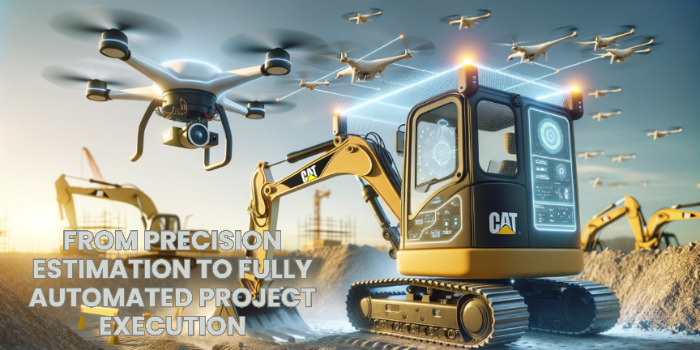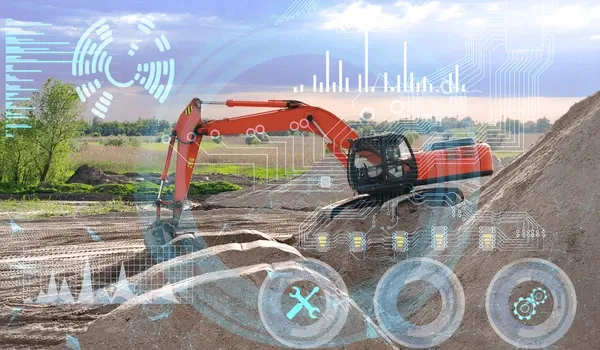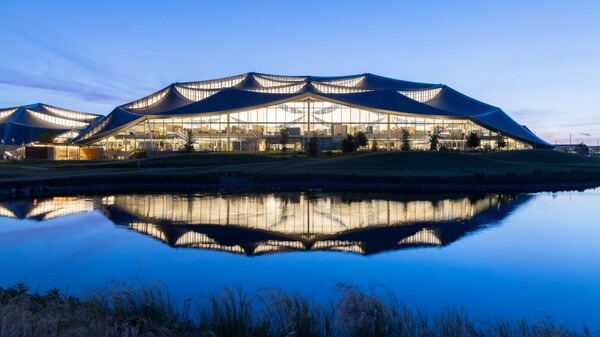
AI in Construction: A Glimpse Into the Future—From Precision Estimation to Fully Automated Project Execution
The construction industry is on the brink of a transformation like never before, driven by the rapid advancements in artificial intelligence (AI). From precise cost estimation to the potential for fully automated project execution, AI is reshaping how construction projects are planned, managed, and delivered. As the demand for efficiency, accuracy, and sustainability grows, integrating AI into construction processes is not just a trend—it's a necessity.
In this article, we'll delve into the transformative power of AI in construction, exploring how it is revolutionizing estimation practices and paving the way for seamless project management with minimal human intervention. We'll also highlight real-world case studies that showcase the impact of AI on construction projects, offering insights into the future of this dynamic industry.
The Evolution of AI in Construction: From Concepts to Reality
The integration of AI into construction has come a long way from being a futuristic concept. Initially, AI's role was limited to improving accuracy in estimations, predicting costs, and minimizing errors. Today, AI is capable of doing much more. Through advanced algorithms, machine learning (ML), and data analysis, AI is now managing entire projects, predicting risks, optimizing schedules, and even controlling machinery on-site.
Enhancing Precision in Estimation: The AI Edge
One of the primary areas where AI has made a significant impact is construction estimation. Traditionally, estimation was a manual, time-consuming process prone to human error. Estimators had to rely on experience, historical data, and a degree of intuition to predict costs. However, AI-driven estimation software has changed this landscape by delivering highly accurate cost predictions in a fraction of the time.
By analyzing vast amounts of data, including material costs, labor rates, and project timelines, AI algorithms can provide estimators with real-time insights. These insights allow for better decision-making and more precise budgeting, ensuring that projects stay on track financially. The result? Fewer cost overruns and better financial planning.
AI Beyond Estimation: Automating Project Execution
While AI's impact on estimation is undeniable, the technology's influence extends far beyond cost calculations. AI is now playing a crucial role in automating various aspects of project execution, leading to more efficient and streamlined operations.

AI-Driven Project Management
Project management is a complex task that involves coordinating various activities, managing resources, and ensuring that timelines are met. AI has the potential to revolutionize this process by automating many of the repetitive tasks that project managers face daily.
For example, AI can automatically generate and update schedules, allocate resources based on real-time data, and even predict potential delays before they occur. This level of automation reduces the burden on project managers, allowing them to focus on higher-level decision-making and problem-solving.
Autonomous Construction Machinery
Imagine a construction site where machinery operates autonomously, guided by AI algorithms that optimize their movements and productivity. This is no longer a distant dream—it's becoming a reality. AI-powered autonomous machinery, such as excavators, bulldozers, and cranes, can now perform tasks with minimal human intervention.
.jpg)
By using AI to analyze data from sensors and cameras, these machines can make real-time decisions, adjust their movements, and complete tasks with precision. This not only improves efficiency but also enhances safety by reducing the need for human operators in potentially dangerous situations.
The Benefits of AI-Driven Construction Automation
The shift towards AI-driven construction automation offers several key benefits that are transforming the industry:
Improved Efficiency: AI-driven automation reduces the time needed for various tasks, from estimation to project execution. This leads to faster project completion and reduced downtime.
Cost Savings: By optimizing processes and minimizing errors, AI helps to reduce costs across the board. This includes lower labor costs, reduced material waste, and fewer cost overruns.
Enhanced Safety: Autonomous machinery and AI-driven decision-making reduce the need for human intervention in hazardous environments, leading to safer construction sites.
Better Risk Management: AI's predictive capabilities allow project managers to identify potential risks early and take proactive measures to mitigate them, reducing the likelihood of costly delays.
Case Studies: AI in Action
Case Study: The Hudson Yards Project, New York
.webp)
One of the most prominent examples of AI in construction is the Hudson Yards project in New York City, the largest private real estate development in U.S. history. AI played a crucial role in the construction of this massive development, which includes office buildings, residential towers, retail spaces, and public parks.
AI-powered tools were used for everything from cost estimation to project scheduling. The project team utilized AI-driven predictive analytics to anticipate potential delays and optimize resource allocation. AI also played a key role in monitoring construction progress through real-time data analysis, allowing for adjustments to be made on the fly.
One of the standout features of the Hudson Yards project was the use of AI-powered drones for site inspections. These drones performed daily flights over the construction site, capturing high-resolution images that were analyzed by AI algorithms to detect any deviations from the project plan. This automation significantly reduced the time required for inspections and improved the overall accuracy of the work being performed.
Case Study: The Sydney Metro Project, Australia

The Sydney Metro project, one of Australia’s largest public transportation initiatives, leveraged AI to streamline construction and reduce costs. This project involved the construction of new railway lines and stations across Sydney, a complex and resource-intensive undertaking.
AI was used extensively in the estimation and planning phases of the project. The project team utilized AI-powered software to analyze historical data from previous rail projects, allowing them to generate precise cost estimates and schedules. This estimation accuracy helped prevent budget overruns and ensured that the project remained on track.
During the construction phase, AI-powered robots were deployed to perform repetitive tasks such as track installation and tunnel boring. These robots worked alongside human crews, significantly speeding up the construction process and reducing the risk of injuries on the job site. AI-driven predictive maintenance tools also played a key role in keeping equipment running smoothly, minimizing downtime, and ensuring that construction progressed without interruptions.
Case Study: The Google Bay View Campus, California

Google's Bay View Campus in Mountain View, California, is another example of AI transforming construction. This innovative project focused on sustainability, utilizing AI to optimize every aspect of the construction process, from design to execution.
AI-powered tools were used to create digital twins of the campus, allowing the project team to simulate various construction scenarios and identify the most efficient approach. These simulations helped reduce material waste and energy consumption, aligning with Google’s commitment to sustainability.
AI also played a key role in managing construction on-site. Drones equipped with AI capabilities performed regular site inspections, ensuring that work was progressing according to plan and identifying any potential issues before they become costly problems. This automation allowed the project team to focus on more strategic tasks, resulting in a faster, more efficient construction process.
The Future of AI in Construction: Challenges and Opportunities
Overcoming Barriers to AI Adoption
While the benefits of AI in construction are clear, the industry still faces several challenges in adopting these technologies. One of the primary barriers is the lack of familiarity and understanding of AI among construction professionals. Many companies are hesitant to invest in AI due to concerns about the complexity of implementation and the potential for job displacement.
To overcome these challenges, the industry needs to invest in education and training programs that help construction professionals understand the value of AI and how to effectively integrate it into their workflows. Additionally, AI developers must work closely with construction companies to create user-friendly tools that are easy to implement and use.
.jpg)
The Potential for Fully Automated Construction
Looking to the future, the ultimate goal of AI in construction is the possibility of fully automated project execution. While this may seem like a distant vision, advances in AI, robotics, and automation technologies are bringing it closer to reality. Imagine a construction site where AI-driven robots handle tasks such as material handling, assembly, and quality control, all under the supervision of a central AI system that coordinates every aspect of the project.
While there are still significant technical and regulatory challenges to overcome, the potential benefits of fully automated construction are immense. Such systems could drastically reduce project timelines, minimize human error, and improve safety, all while reducing costs and environmental impact.
Conclusion: Embracing the AI Revolution in Construction
The integration of AI into the construction industry is not just a technological advancement—it's a revolution that has the potential to transform every aspect of the industry. From precision estimation to fully automated project execution, AI offers unprecedented opportunities for efficiency, accuracy, and innovation.
As the case studies in this article demonstrate, companies that embrace AI are already reaping the rewards in the form of more competitive bids, streamlined project management, and successful project outcomes. The future of construction lies in the hands of those who are willing to harness the power of AI and push the boundaries of what's possible.
By investing in AI technologies and fostering a culture of innovation, construction companies can position themselves at the forefront of this exciting new era. The road ahead may be challenging, but the potential rewards are well worth the journey. The future of construction is bright, and AI is leading the way.
Check https://app.bidlight.com for how BidLight can help you estimate your project!